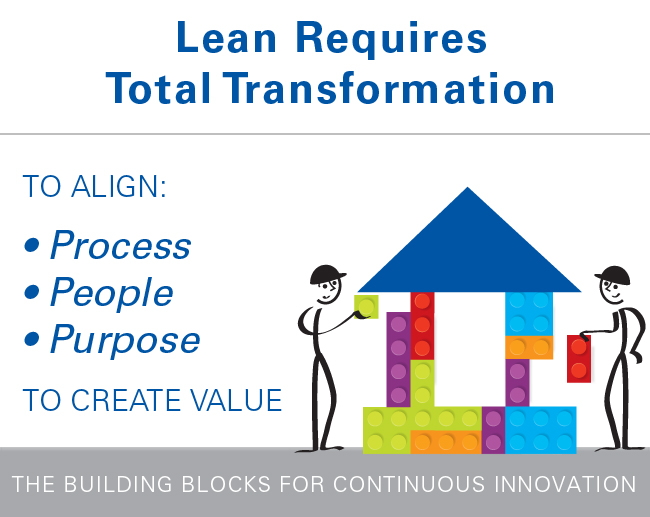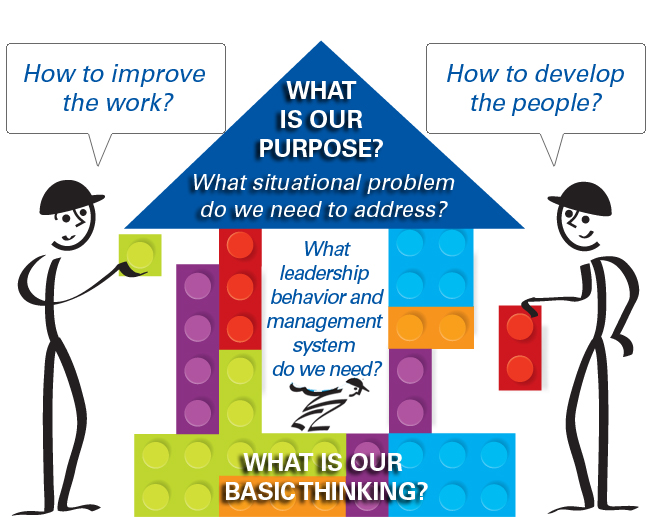We are all trying to transform. That’s what lean thinking and practice are all about: challenging us to reflect deeply on how we can improve this situation, improve my organization, or improve myself (and of course, all three.) Each of us knows from experience that this work is never easy. Whether you are toiling at the gemba, struggling with your mid-level team, or fighting to transform your organization, this is tough work.
A Transformation Model
Better understanding the nature of transformation is core to the mission of LEI today. At the company level a transformation is a very big experiment indeed. In fact, many of the presenters at this year’s Lean Transformation Summit (more on that later) will illustrate what this means at both the macro level, and at the very granular level of the dailyóhourlyóimmediateówork itself. Sharing this model with you, and helping others practice and develop it, enables us at LEI to narrow a gap regarding our aim.
Observing efforts in the community over many years ñ often working with you side-by-side ñ we have learned that successful transformation calls for a situational approach that is based on innovating key dimensions of any organization through addressing a series of questions. These questions are fractalómeaning that the same questions apply whether working at the macro enterprise level or the level of individual responsibility as you dive progressively deeper into each dimension. But, while the transformation model that has emerged through years of experience is situational, the nature of the questions represent a clear point of view: if an organization fails to address each question, and with a sense of how each relates to the others, the transformation is headed for trouble.
Fundamentally, the process of successful lean transformation rests on applying PDCA cycles of experimentation (the art and craft of science) at every level, everywhere, all the time. Being situational means that every story is going to be specific and different (each situation has a different aim or purpose). Being grounded in a common set of principles yet situational in application provides rich opportunity for the development of truly profound wisdom. But, lean thinking and practice, and lean transformation, entail more than PDCA alone; the lean approach to transformation carries some specific value judgments as well.
Effective total transformation entails transforming five fundamental dimensions, through continuously addressing key questions associated with each:
By tackling each dimension through addressing questions, we avoid the lean no-no of prescriptively giving solutions as is typical of “lean implementation approaches.” Thus, we can have a dynamic approach to transformation in which each organization creates its own unique approach, one that helps them achieve their unique purpose through practical utilization of the deep wisdom embedded in the lean practices that have evolved over decades of rigorous PDCA.
Learning from the collective experience of the lean community we know that tackling the five dimensions through continually and thoroughly addressing these questions is both necessary and sufficient (!) for a successful enterprise-wide transformation.
Community Transformation?
We at LEI learn tremendously from youóthe struggles and successes of the collective experience of the lean community. And the community continues to expand; in fact we need to start speaking in terms of lean communities (pl). Adjacent communities are intersecting, colliding, and converging, which is as it should be. Long-time adjacent communities such as organizational learning, systems thinking, psychology, social sciences, and operations research collide with new communities such as Lean Startup and the “Maker” (small entrepreneurial manufacturing startups using low-capital technologies and low-risk strategies) movements.
A lot of activity to be sureóbut can we say that where there is activity there is learning? Unfortunately, not. It’s helpful vital for us to be intentional in our learning. And intentional in approach to transformation.
That’s exactly what we will explore at our annual Lean Transformation Summit, On hand to help us will be:
Mike Lamach, CEO of Ingersoll Rand and the most lean-knowledgeable chief executive of any large US industrial I know.
Cardinal Health Vice President Bill Owad who is leading a Lean Leader Development program designed explicitly to produce more leaders like Mike.
GE Appliances Vice President of Technology Kevin Nolan, who is leading initiatives at the intersection of more traditional lean operations improvement with applications of lean thinking to new product development, including introducing Lean Startup practices to GE’s process.
(In the realm of product development and innovation, Durward Sobek and Jim Morgan will also be on hand to help us launch the second edition of Al Ward’s groundbreaking book, Lean Product and Process Development.)
NYC Food Back CEO Margarette Purvis, who is showing the world how kaizen can help us all help others more effectively and efficiently through improving the process of feeding one and a half million New Yorkers every day. The video of their work with TSSC (the Toyota Production System Support Center) has gone viral with good reason.
Join me and 500 other members of the community to learn from these remarkable individuals and from each other at our annual Lean Transformation Summit in Orlando on March 5-6. We’ll share lessons, struggles, successes we face as we set about with the hard work of lean transformation.
John
John Shook
Chairman and CEO
Lean Enterprise Institute, Inc.
jshook@lean.org








